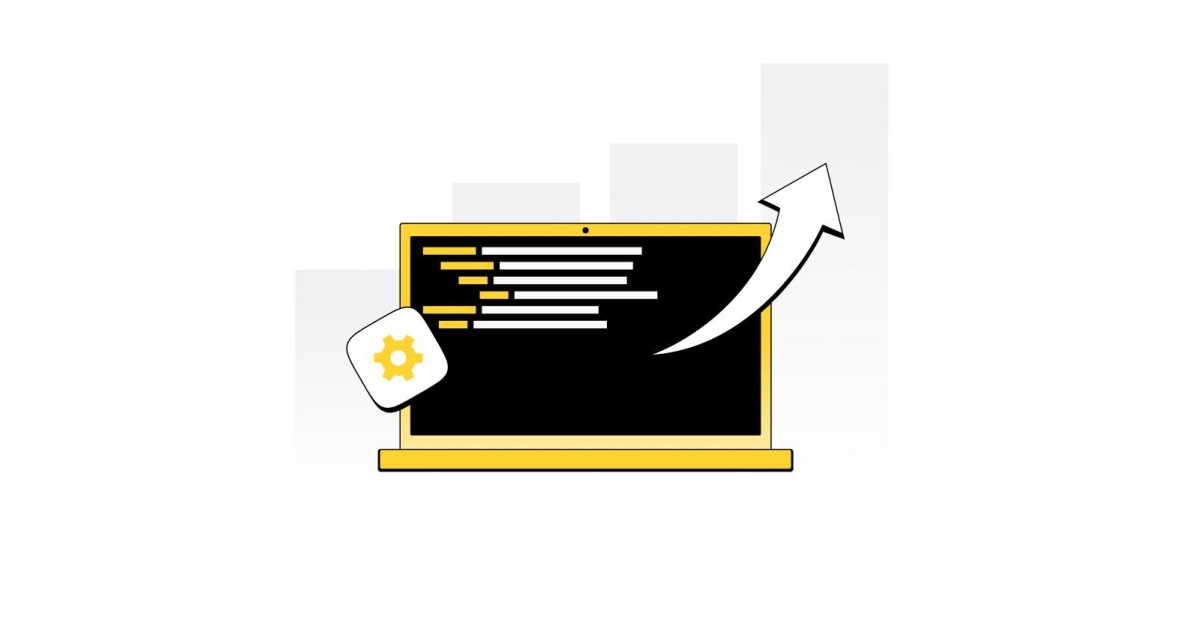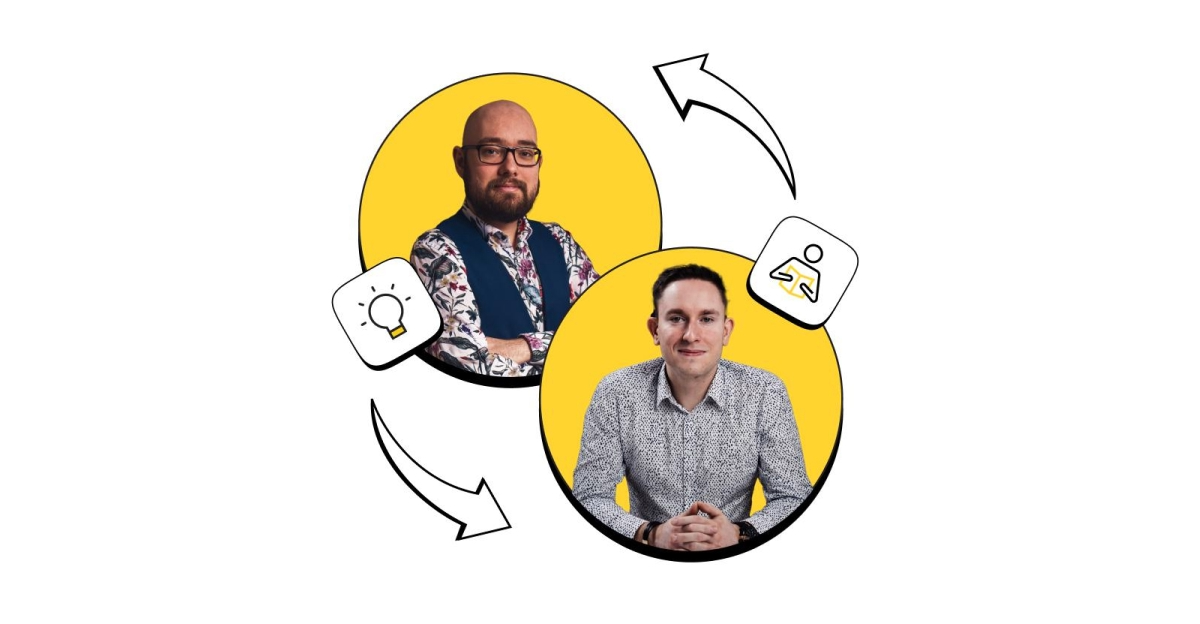Tech
Interview
What it Means to Lead a Tech Team: Interview with Łukasz Krzyżański
Read about Łukasz’s journey to becoming a Tech Team Lead and explore the influence that mentoring had on his self-development and growth.

Łukasz Krzyżański is a Tech Team Lead at MasterBorn. He joined the team two years ago and has risen in the ranks from Middle Developer to a role in leadership. In this interview, we delve into what it’s like to be a Tech Team Lead and what lessons Łukasz has gained from his experience.
To Łukasz, part of being an effective leader is about clear communication as well as empathy and dedication to the people who you work alongside. Setting up highly independent and self organizing teams that consistently deliver great work is essential to his calling. His mentors at previous companies and Masterborn alike instilled a sense of responsibility and of technical acumen.
Those lessons inform his own mentorship philosophy as he guides a team to develop their own careers at MasterBorn and beyond. Take a look inside the Tech Team and what it means to be a leader here.
It started back in 2020 when the pandemic made it hard for all of us — my former company as well. The owners recognized my needs for growth and for taking on more responsibility, but weren’t in a position to provide it at the time. Nothing against them, of course, they taught me a lot and I’m incredibly grateful for the experience I gained, it’s just that I was ready to move up in my career. They were the ones that actually encouraged me to seek greater responsibility.
I wanted to develop my own skills as a Backend Developer in Node.js and so I started to look for new challenges. I was looking for open roles in dynamic companies that encourage ambition but are also safe, nurturing places where I can take risks and push myself and my team.
Right after I started at MasterBorn, I landed in the Riskalyze project as a middle developer working on the Risk Alignment Platform. It was a really rewarding project because of its complexity and many of the solutions we designed. I got a real sense of what it was like working here and also with clients.

There’s always something new to learn. I’m a sponge and absorb knowledge from the team, current work and, of course, exchange of know-how with other projects. I like to tackle edge cases with my team, especially if someone is really passionate about solving them. I learn a lot from other people bringing those innovations to a project. Those are always where the real innovations emerge. Working with these systems gives you a better understanding of how apps and other programs should work.
I’m adamant about taking the time to listen to and discuss topics in our Tech Talks, our internal knowledge sharing sessions. There’s also a mentoring program that I really value and am actively part of.
Similar to developing coding skills, I generally learn from projects, my team and my peers. As I said, the TechTalks highlight really valuable new edge cases, new projects, new problems we need to solve. People are my greatest source of knowledge.
Since it’s more of a leadership role, I focus more on soft skills and leadership rather than tech skills. Part of that has to do with fostering empathy, especially in listening. One of the first things I had to learn the hard way was to delegate and to lead by example. The biggest part of that is to learn from tough situations in projects and to be open and transparent about how we plan to improve. Self-awareness is key here. My mentor started to help me develop those skills from the beginning, but there’s always more to learn and ways to be a better leader.

It was Przemek Królik, our CTO. I was really lucky to have been paired with him and I’m glad that he was my mentor. And not just because he’s the CTO. Przemek knows a lot and is really good at sharing his knowledge with me and others. He also admits when he makes a mistake and is transparent about his shortcomings — something that I admire in a leader. I learned a lot. Not only about technical backend things, but also DevOps, infrastructure, cloud and AWS.
Back then, he was the only person at MasterBorn who had access to our infrastructure — so he had a very high “bus factor.”
If he’d been hit by a bus, he’d be the only one who knew how everything functioned. Not ideal for a growing company — any company, obviously.
In software development it’s just a term about dependencies and vulnerabilities if someone leaves your team for whatever reason. It’s something you should hedge against as an organization and part of that is cross training and being thorough about documentation so someone can pick up for you if they need to.
That’s what we were doing. It was also where I wanted to expand my expertise so I started to learn about cloud and infrastructure and started taking on more of that responsibility.
Oh yes, and it’s still Przemek, although it’s more of a partnership now. We’ll often consult each other on various topics and support each other in our work. Our roles are complementary and so there’s quite a bit of overlap in what we do day-to-day, just in different contexts.

I do! I have three mentees: Damian Kokot, Jakub Basak and Grzegorz Piotrowski — all middle Backend Developers — and I think it’s fantastic. Guiding people in their careers is one of my main motivations for being a Tech Team Leader.
Each of my mentees is a different person and requires three totally different approaches. Getting to know what motivates them and what their own career goals look like is the really important first step.
I listen to their needs and create a safe space to not only talk about tech and solutions, but also personal issues. When they grow, I grow. We all challenge each other to become better as well.
Oh, no. I didn’t plan that, it happened naturally. I didn’t choose to be a Team Lead, the role chose me. ;-)
But seriously — I’m very responsible and always want to deliver solutions. I care a lot and look after the team. Part of that is anticipating future problems, that’s just how I am.
Also, my mom is a teacher — a damn good one and very underpaid — as teachers in Poland are. Following her example, I always wanted to be a wise dude who helps others and offers bits of wisdom. A Dev-wizard. So I became that sort of tech advisor.
I also firmly believe that good developers know how to code, but that great developers understand business. None of anything we do in this industry exists in a vacuum. We exist to solve business problems. I constantly want to develop my business acumen in order to understand client needs and perspectives better.
I work closely with our Proxy Product Owners and we operate as a team. I believe my role is to deliver value and protect the team so they work smoothly and effectively.
I’m glad you asked. Many companies tap leaders based on seniority alone. Senior developers often get these offers — ones they can’t refuse. But here, no, it was my decision and there was no pressure. My behavior and approach led me towards becoming a Tech Team Lead organically.

It’s a managerial role so I’m more focused on soft skills, communication, feedback and leadership. It’s about 60/40 managing to coding. But the coding portion involves code review. In my case I handle DevOps.
I also get to supervise the project as a whole rather than dialing down on one part.
I’d say the biggest difference is that I have to balance both technical and business problems and often have to code switch between those two worlds. Explaining why a specific solution is better than another — or why it’s worth it to do the more technically challenging thing sooner rather than later is part of my role I really find rewarding. It’s not always easy, but I enjoy it.
It’s a similar role, but on a different scale. Tech Team Leaders are essentially CTOs, but on a project level. Specifically, I'm a tech manager of a project and execute strategy and guidelines that the CTO sets out. The CTO is also more involved with the company’s overall direction and has quite a bit more responsibility.
Of course, we share some tasks as well. For example, we both interview candidates and weigh in on hiring decisions.

I’d say one of the big ones is sustaining the right approach and mindset in the team. Making sure everyone’s needs are being met and we're avoiding burnout. As I’ve said, communication is so important to help address that. We foster a flat structure where everyone can say what they mean in clear, but empathetic discussion.
I’ll give you an example. Recently a developer on my team went on a two-week vacation. When he came back, he asked how everything went while he was gone.
I had a few ways to answer this question: If I had said, “Everything was great,” he might have felt unnecessary. It may have come across as me saying we don’t really need him afterall — not a way to motivate anyone.
On the other end of the spectrum, if I had said “it was a circus, we’re so glad you’re finally back,” this person may hesitate to take a vacation in the future, or not be able to fully rest while he’s away — a great way to burn people out.
Finally I said, “Everything went ok, although sometimes we missed you and your contribution as it's really valuable.” — I showed him that we wanted and needed him here, but we managed!
Crafting a message that lands the right is tough. A message that is honest but generates a good response in the recipient. Sometimes one poor sentence can kill motivation and cause a cascade of friction and resentment.
I’m still learning about it and I know it’s going to be a lifelong journey.

Every project is different, of course. But here are some of the highlights from some of the projects I’ve worked on.
Riskalyze was one of the longest projects I was part of. As I mentioned, it’s the first project I worked on when I joined MasterBorn. It lasted about a year and a half. I really deepened my expertise in Node.js and DevOps, especially for the FinTech sector.
That project was also where I started to work on my leadership skills and when I became the Tech Team Lead.
Another project is Foh&Boh. That’s one where I found out how it feels to be unnecessary — which was great! When you can delegate responsibility and everything runs like clockwork, it’s a great day to be a leader.
I will say that mindset took some getting used to, but effective delegation and some trust in your team goes a long way to produce some excellent results. Striking a balance between being an absentee manager and a micromanager is tough, but I learned my goal as a leader is often to get out of the team’s way if the results are there.
Tentacle also stands out as a highly technical project that I learned a lot from, especially about InfoSec. It’s a mature project that I’m still working on currently. Joining a highly experienced team taught me a lot. I had to get up to speed quickly and be able to confidently strategize and manage the project.
Sure, when I have to tell a client about a delay or give harsh feedback to my team.
The way we work assumes that the whole team is responsible for the project’s success so if something goes wrong we don’t point fingers in our retrospectives, but at times, it is my role to pull that person aside and discover what happened to avoid it in the future. And that’s often not easy.
I have two ways. First, I keep my work and life strictly separate. It's sacred. I don’t work in the evenings and weekends are also reserved for me to close my computer and reset my mind.
After work I play with my dog and play video and board games (not with the dog, though).
Second is through human interaction. Talking with my mentor or friends to bounce ideas back and forth, take in other perspectives, laugh and just let go.

Oh wow, for video games: Heroes III, Final Fantasy XIV and Red Dead Redemption 2!
For board games, Gloomhaven, PENNY DREADFUN: Duchy, Demony, Dickensy. Wingspan too!
I really like RPG and fantasy, especially strategy games. Not ones you just throw the dice — I want to plan and predict all the possible outcomes.
I wanted to share knowledge and lead teams and now I’ve done it. Now I just want to keep that direction and develop myself in a place that has the same values as mine.
I don’t have a strict plan of becoming a CTO or have my own startup.
I want to become better, master my communication skills and become a better leader. If there’s any lesson from 2020, it’s that planning can be pointless. I’m very grateful for what I have and just try to live my life to the fullest.
Thank you!
Partner with world-class experts who understand your challenges, deliver seamless solutions, and support you every step of the way.